It was with much persuasion and parental bullying (just kidding mum and dad!) that we flew the 17 hours to Taipei to celebrate Lunar New Year (or, more commonly known as Chinese New Year).
I was born in Taipei, but left to grow up in Australia at the age of ten. As far as I am aware, I have never celebrated Lunar New Year in Taipei since leaving so this would be the first time for me, as a grown up, to enjoy the festivities in the country that I have no associated as home for the past 27 years.
So you could say that I, along with my husband, experienced the whole thing from foreign eyes, and we had an amazing time!
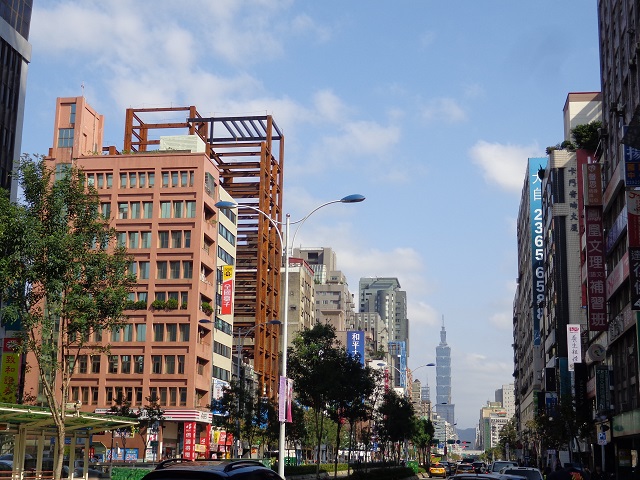
Why do I keep calling it Lunar New Year
Ah, first things first. You’ll notice that I am using the term Lunar New Year, not Chinese New Year to describe the festivities that happen annually around this time of the year.
That is because it is a New Year that isn’t just celebrated by the Chinese, but by every culture that uses the Lunar calendar, which include people of Japan, Korea, Tibet, Vietnam and Mongolia.
The calendar is based on the cycle of the moon, and is traditionally used to depict agricultural related seasons.
In Chinese, the word used for Lunar New Year is 春節 (Chūn Jié), which means Spring Festival.
Just so you know :)
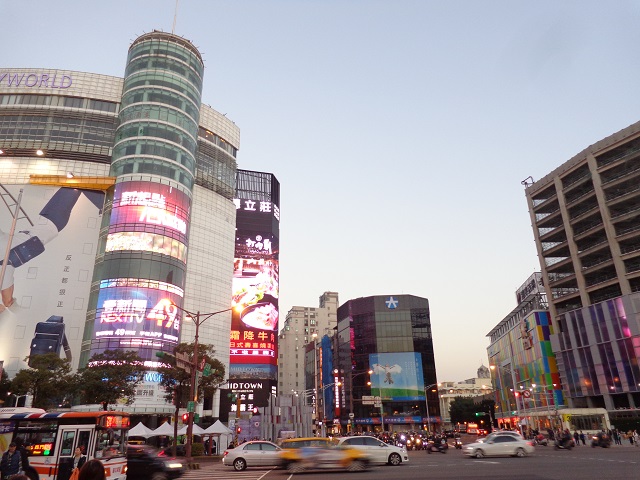
A traditional event in a modernised Taipei
My memories of Taipei are of rice fields and swamps. My parents had a flat on the very outskirts of Taipei beyond the Keelung river that was considered a farming community at the time.
It was where I had collected tadpoles from the water pools around stalks of rice, shooed at chickens that pecked too close to my feet and got chased by stray dogs that linger around the farm houses for their daily feed.
When we visited this time, the fields of rice plants have been replaced by new developments of office blocks and modern apartments, and all along the river, along the flood zone that used to be forever covered in sticky mud are now reclaimed land, with beautiful cycle lanes and footpaths for outdoor recreation.
However, I was glad to find that there were certain things the Taiwanese held closely guarded from modernisation – the night markets, and the celebration of Lunar New Year.
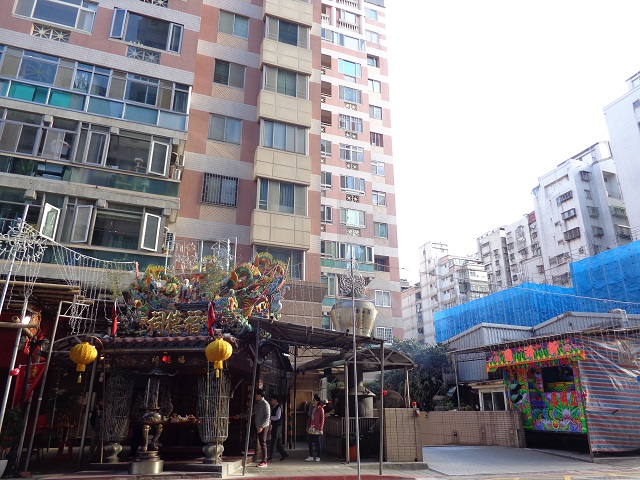
How most Taiwanese celebrate Lunar New Year
I am aware the tradition of Lunar New Year is probably very similar among all the cultures that celebrate it, but I am just going to describe my experience celebrating it in Taiwan with my family.
Lunar New Year in Taiwan is celebrated with a week long public holiday (lucky them!) to coordinate the traditional significance of each day pre and post turning of the new year.
In contrary to popular believe, the Lunar New Year isn’t celebrated with rowdy parties and street parades. It is a very personal time for the families to gather and in fact, Taipei is practically empty during this period.
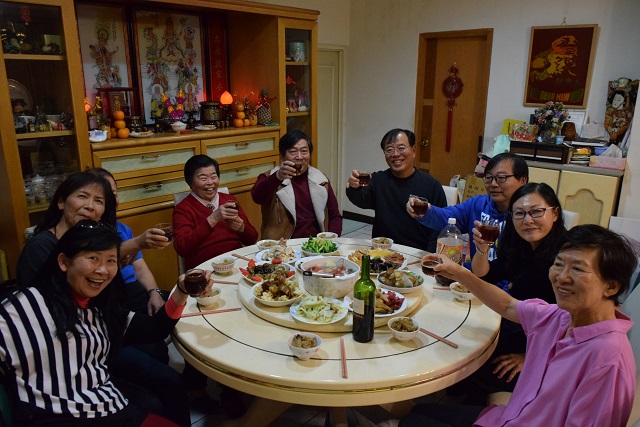
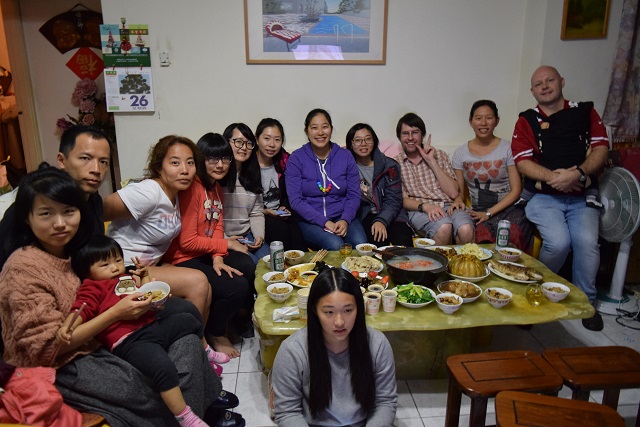
The family New Years Eve dinner
Our celebration began on New Years Eve, which fell on 27 January this year with a big family dinner, usually held at the head of the house – in our case, this was my grandmother’s house. And the tradition is, that all wives must attend this dinner, at the husband’s household.
This is no normal dinner. The story goes that a beast, who only comes to the land of the mortals at the turning of the New Year (so, midnight New Years Eve) comes to disrupt families by hunting people and taking them away with it as food for the rest of the year.
So you could say, this is possibly the last supper among family members, as no one knows if they’ll survive the night!
It is also during both the New Year’s Eve dinner and New Year’s day that we give each other ‘Red Packets’. As adults we no longer get real money in our envelopes, but novelty money, or sometimes scratchies. Yet, this tradition is still fun and always popular with the little ones!
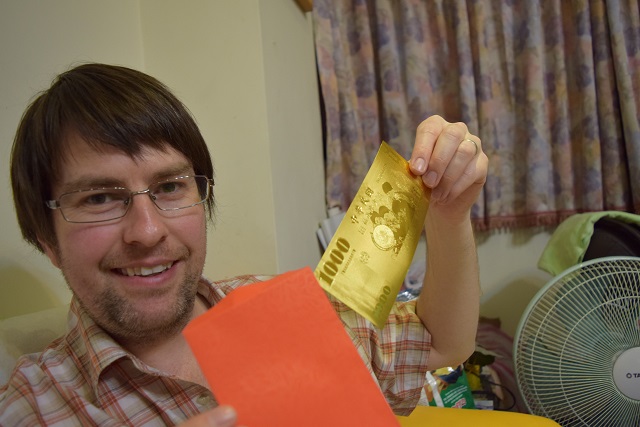
Congratulations on surviving through to New Year’s Day!
Having lived through the night, on New Year’s Day, you don’t say ‘Happy New Year’. For Lunar New Year, you say ‘Gong Xi’ which means congratulations.
Congratulations for still being here and surviving the New Year’s beast!
Anyway. Other than that, the first day of the New Year in Taiwan is the day you pay your respects to the gods, and pray for all the good things for the year.
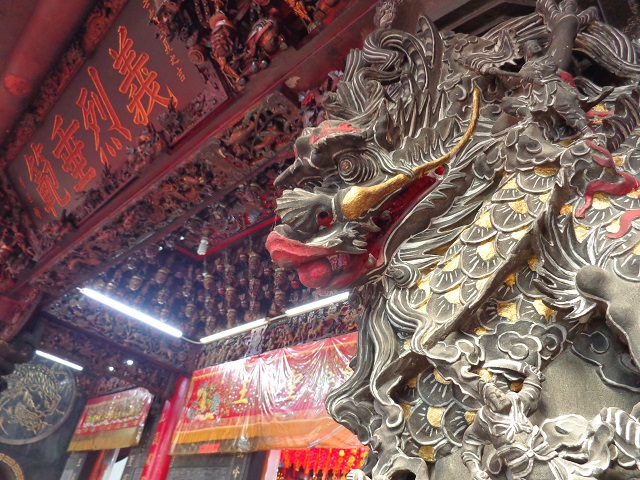
Temple visits to settle your zodiac
The traditional religion, or rather, the way of life in Taiwan (because most people have a second religion, such as Christianity, introduced by European missionaries) is Taoism.
And the Taoist believe whatever zodiac year we are in (this year is the year of the Chicken/Rooster) it is actually not very good for people who were born under that year. So anyone who was born in the year of the chicken must have their zodiac spirits settled by a temple blessing.
Taoist temples of all sizes, dedicated to different gods and goddesses can be seen dotted around the streets even in the bustling city centre of Taipei.
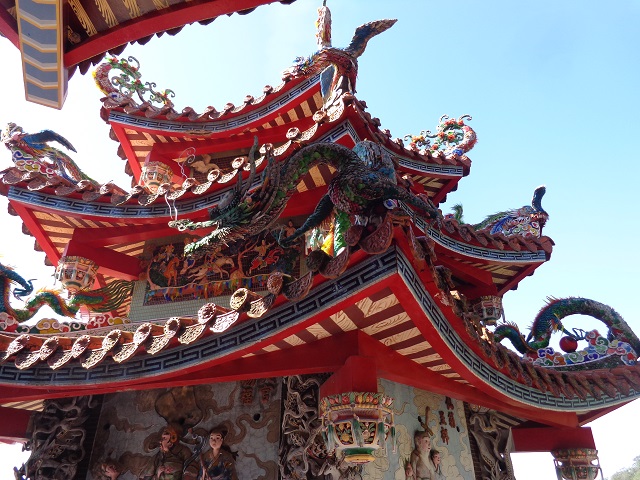
However, being on the outskirts of the city, my family’s choice of a temple is on the hills near Neihu.
After battling half an hour of traffic up the hill (actually, that’s a pretty good record!) the entire family arrived at the temple to begin the circuit of worship.
Incense in hand, we followed the masses to the different stations that require our attention. First the skies, then the God of Creation (I think?) and finally, a steep climb to the top temple to offer our last incense to the highest order.
The whole time I was mesmerised by the colourful roofs of the temple decorated with dragons and all sorts of mystic creatures; the sound of bells and chanting of the monks and nuns and from the balcony perched on the hill top, a sweeping view of Taipei city!
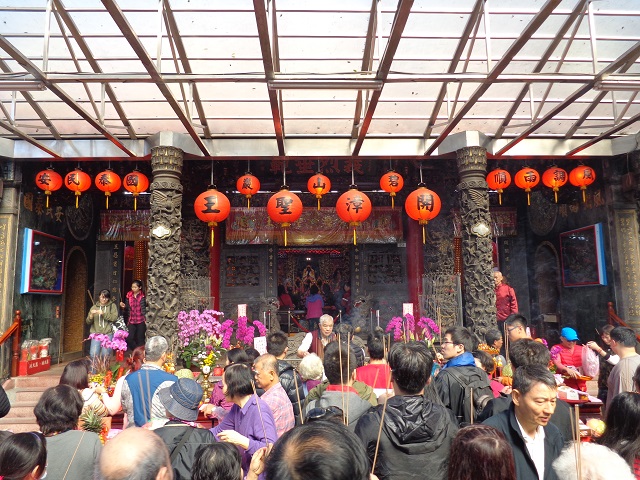
The second day of the New Year is for the wives family
The Taiwanese culture is still very much patriarchal, something that was installed by the Japanese occupation before WWI. Once a woman marries a man, she marries into the family and will spend most of her days serving and living with the husband’s family.
The second day of every Lunar New Year, is the day where the married couple, and children if any, will return to the ‘Mother’s home’ – the woman’s family – to pay their respects and a chance for the woman to reunite with her side of kin.
While women in today’s society no longer play such an inferior role, this tradition is still practiced.
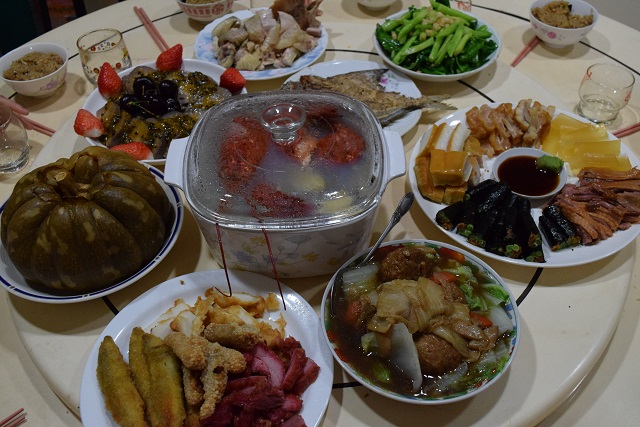
A week of feasts, fire crackers and lotteries!
For the first five days of the Lunar New Year, everyday has some significance attached to them. It is the week many visit family and friends, but one thing I really wanted to do is to play with some fire crackers!
For safety reasons, Taipei city has banned fire crackers from residential streets and you are only allowed to ignite and shoot them off by the river.
And it was by the river that I re-lived some of my childhood favourites, such as a shooting fire cracker and one that’s called a fire butterfly, which spins upwards in a flourish and explodes into small crackles of sparks!
Lunar New Year is also the time to try out your luck at lotteries. I don’t particularly gamble but while most shops are shut for the festivities, the lottery stores were busy with people everyday trying their luck with scratchies!
Taipei is emptied during Lunar New Year
As I said above, Lunar New Year isn’t celebrated with street parties and parades like it is in the Western cultures. Most businesses shut for the entire week, leaving only convenience stores, supermarkets and the odd major shopping malls open for a mostly tourist and service trade.
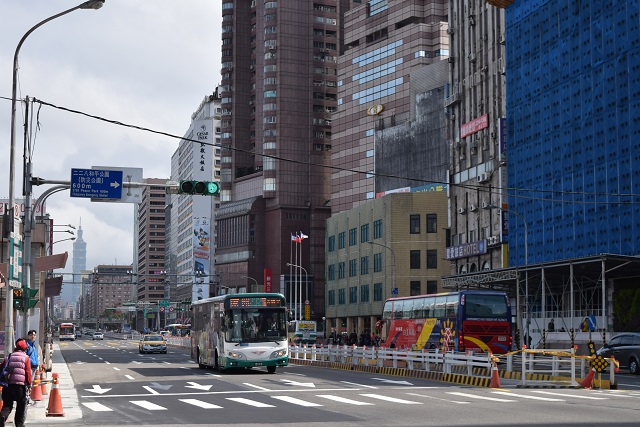
A normally busy city, it was weird watching people drain out of Taipei for the week. Streets emptied and shop fronts firmly shut.
So, in a way, this is the worst time to visit Taipei! Food for thought for planning your visit.
Where have you celebrated Lunar New Year? Share your experiences in the comments below!
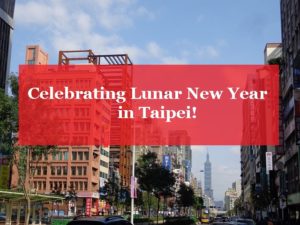
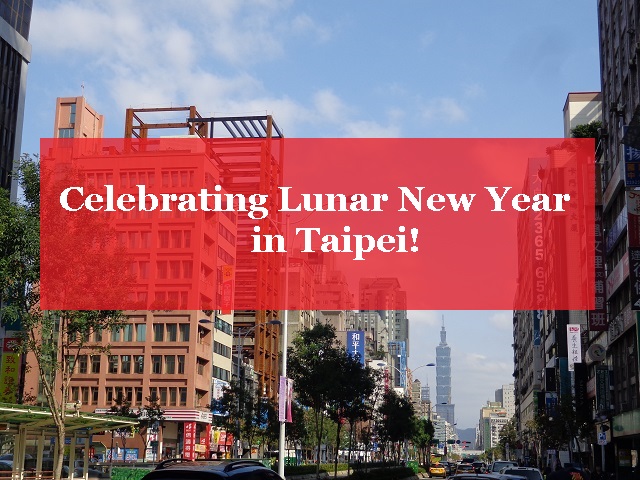
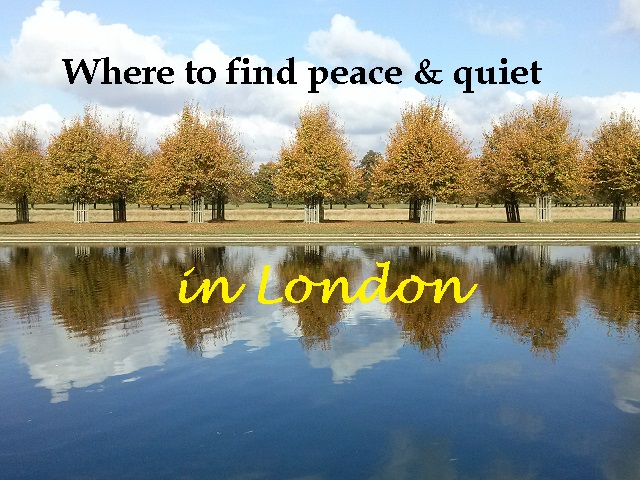 Where to enjoy the quieter side of London
Where to enjoy the quieter side of London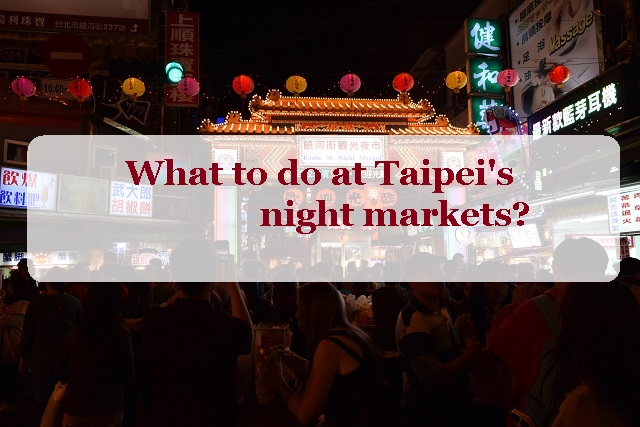
Share your thoughts below!